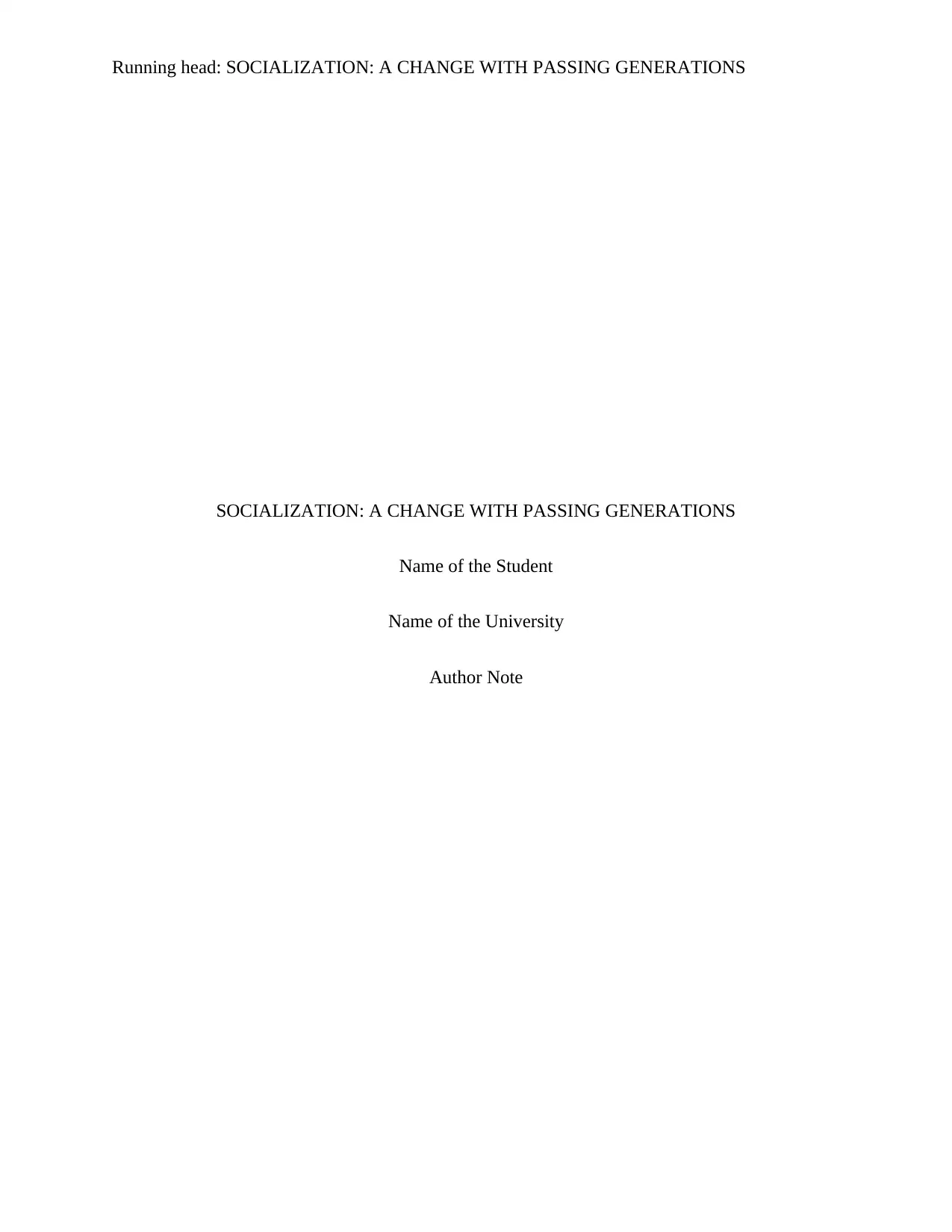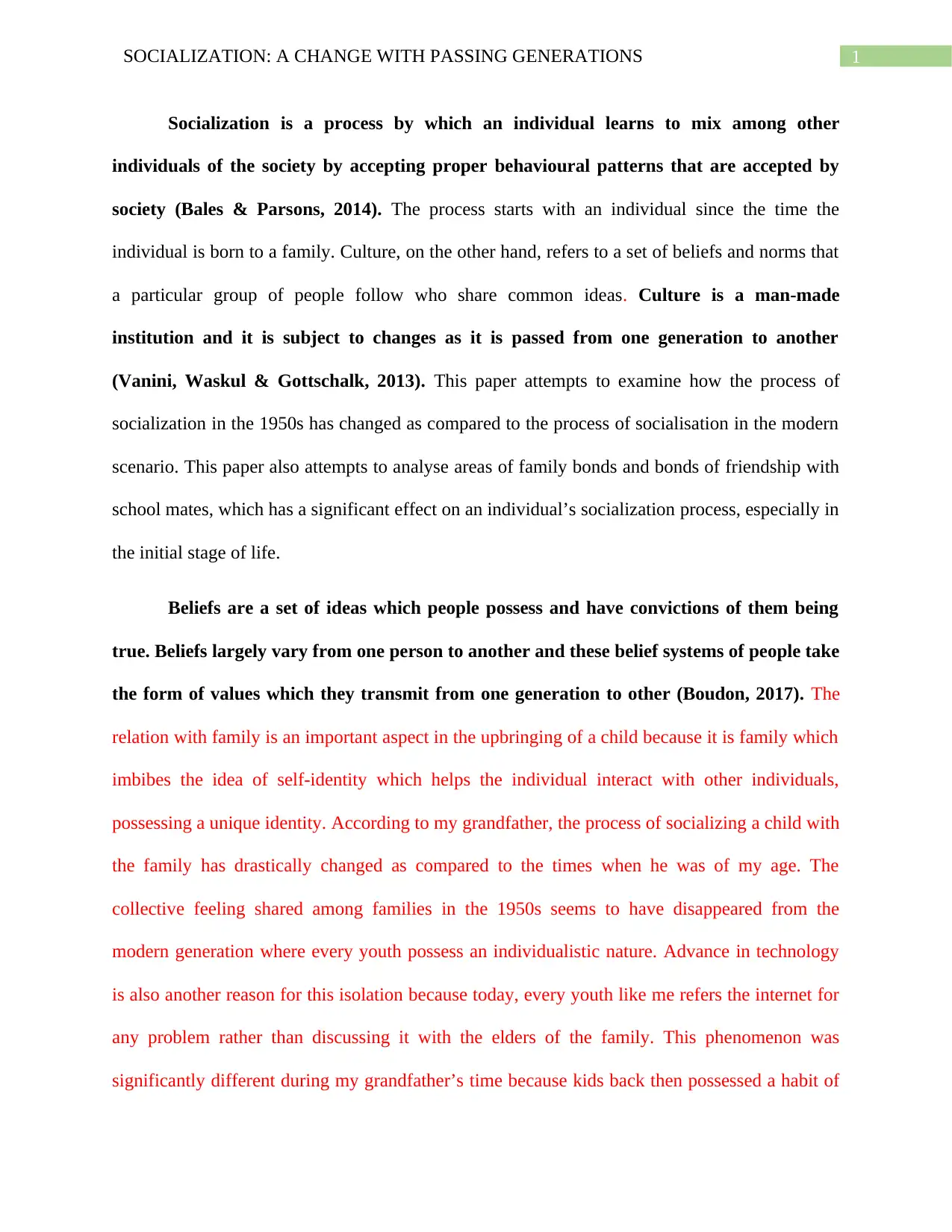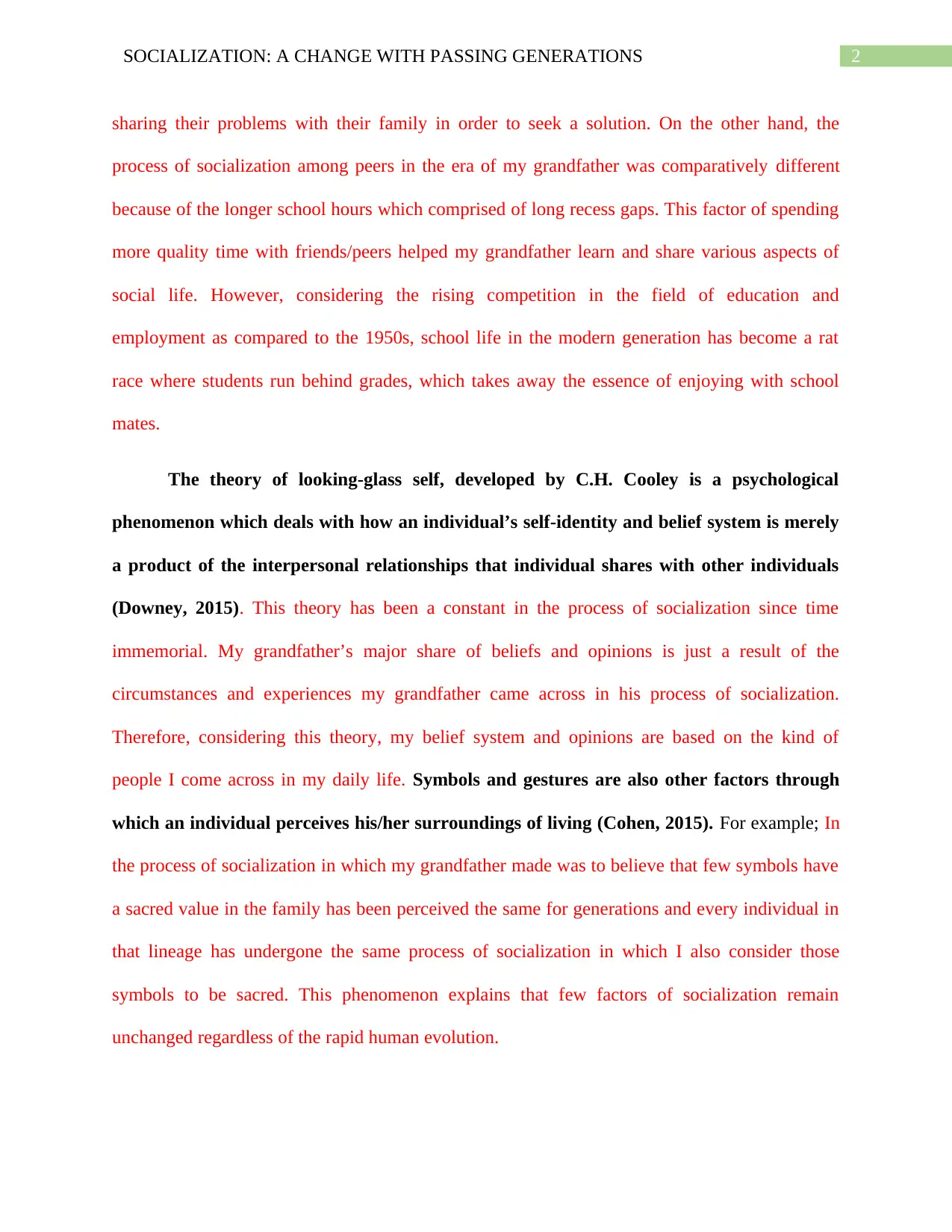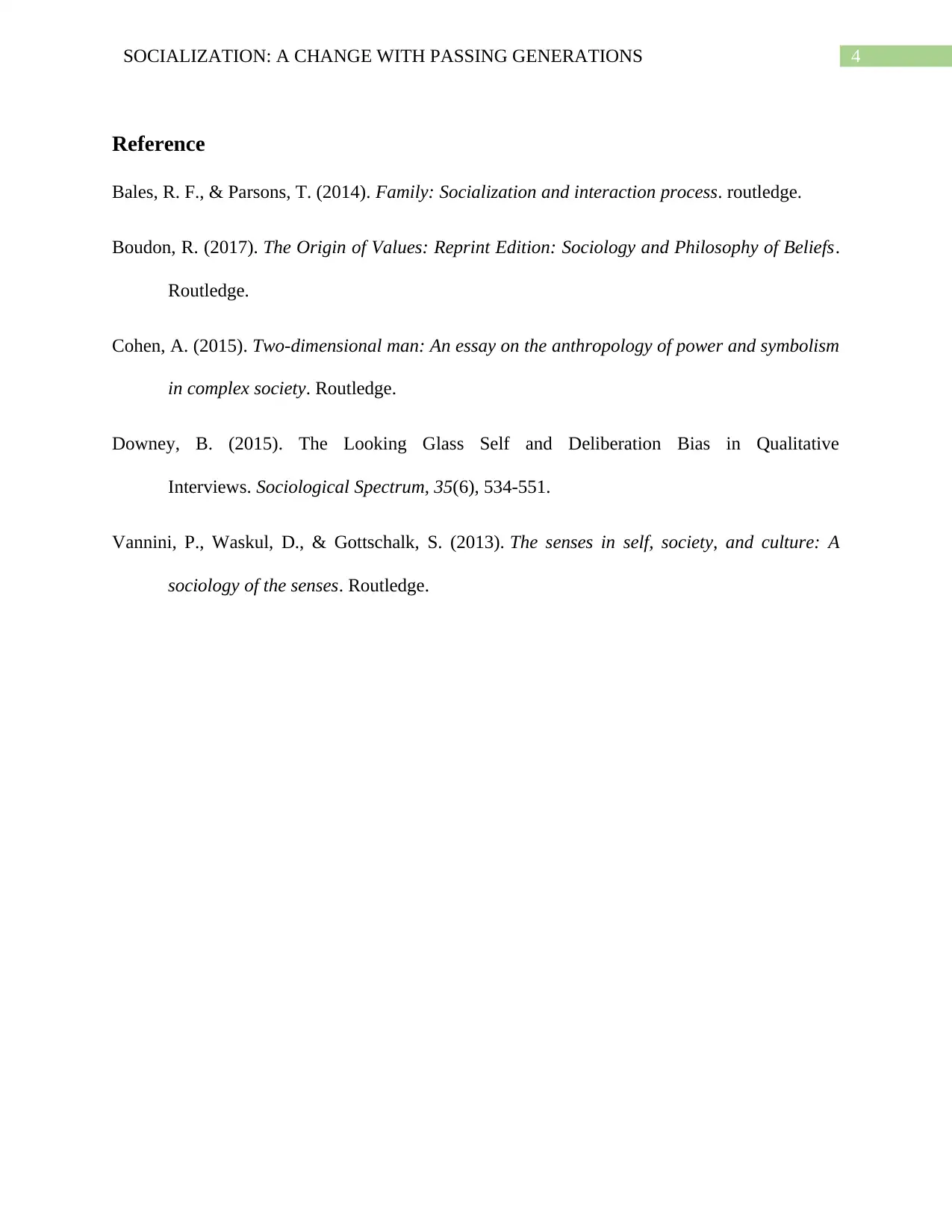Socialization: Comparing Generational Shifts in Family and Peer Bonds
VerifiedAdded on 2023/04/21
|5
|955
|436
Essay
AI Summary
This essay explores the evolution of socialization by comparing the process in the 1950s with the modern era. It examines the impact of family bonds and peer relationships on an individual's socialization, highlighting how technological advancements and societal changes have altered these dynamics. The author contrasts the collective family feelings of the 1950s with the individualistic nature of modern youth, also discussing the role of technology and the impact of changing school environments. Using C.H. Cooley's looking-glass self theory, the essay emphasizes how interpersonal relationships shape self-identity and beliefs. The essay also touches upon the unchanging aspects of socialization, such as the enduring impact of symbols and gestures, concluding that societal frameworks significantly influence socialization processes, while some elements remain constant for adaptation and survival.

Running head: SOCIALIZATION: A CHANGE WITH PASSING GENERATIONS
SOCIALIZATION: A CHANGE WITH PASSING GENERATIONS
Name of the Student
Name of the University
Author Note
SOCIALIZATION: A CHANGE WITH PASSING GENERATIONS
Name of the Student
Name of the University
Author Note
Paraphrase This Document
Need a fresh take? Get an instant paraphrase of this document with our AI Paraphraser

1SOCIALIZATION: A CHANGE WITH PASSING GENERATIONS
Socialization is a process by which an individual learns to mix among other
individuals of the society by accepting proper behavioural patterns that are accepted by
society (Bales & Parsons, 2014). The process starts with an individual since the time the
individual is born to a family. Culture, on the other hand, refers to a set of beliefs and norms that
a particular group of people follow who share common ideas. Culture is a man-made
institution and it is subject to changes as it is passed from one generation to another
(Vanini, Waskul & Gottschalk, 2013). This paper attempts to examine how the process of
socialization in the 1950s has changed as compared to the process of socialisation in the modern
scenario. This paper also attempts to analyse areas of family bonds and bonds of friendship with
school mates, which has a significant effect on an individual’s socialization process, especially in
the initial stage of life.
Beliefs are a set of ideas which people possess and have convictions of them being
true. Beliefs largely vary from one person to another and these belief systems of people take
the form of values which they transmit from one generation to other (Boudon, 2017). The
relation with family is an important aspect in the upbringing of a child because it is family which
imbibes the idea of self-identity which helps the individual interact with other individuals,
possessing a unique identity. According to my grandfather, the process of socializing a child with
the family has drastically changed as compared to the times when he was of my age. The
collective feeling shared among families in the 1950s seems to have disappeared from the
modern generation where every youth possess an individualistic nature. Advance in technology
is also another reason for this isolation because today, every youth like me refers the internet for
any problem rather than discussing it with the elders of the family. This phenomenon was
significantly different during my grandfather’s time because kids back then possessed a habit of
Socialization is a process by which an individual learns to mix among other
individuals of the society by accepting proper behavioural patterns that are accepted by
society (Bales & Parsons, 2014). The process starts with an individual since the time the
individual is born to a family. Culture, on the other hand, refers to a set of beliefs and norms that
a particular group of people follow who share common ideas. Culture is a man-made
institution and it is subject to changes as it is passed from one generation to another
(Vanini, Waskul & Gottschalk, 2013). This paper attempts to examine how the process of
socialization in the 1950s has changed as compared to the process of socialisation in the modern
scenario. This paper also attempts to analyse areas of family bonds and bonds of friendship with
school mates, which has a significant effect on an individual’s socialization process, especially in
the initial stage of life.
Beliefs are a set of ideas which people possess and have convictions of them being
true. Beliefs largely vary from one person to another and these belief systems of people take
the form of values which they transmit from one generation to other (Boudon, 2017). The
relation with family is an important aspect in the upbringing of a child because it is family which
imbibes the idea of self-identity which helps the individual interact with other individuals,
possessing a unique identity. According to my grandfather, the process of socializing a child with
the family has drastically changed as compared to the times when he was of my age. The
collective feeling shared among families in the 1950s seems to have disappeared from the
modern generation where every youth possess an individualistic nature. Advance in technology
is also another reason for this isolation because today, every youth like me refers the internet for
any problem rather than discussing it with the elders of the family. This phenomenon was
significantly different during my grandfather’s time because kids back then possessed a habit of

2SOCIALIZATION: A CHANGE WITH PASSING GENERATIONS
sharing their problems with their family in order to seek a solution. On the other hand, the
process of socialization among peers in the era of my grandfather was comparatively different
because of the longer school hours which comprised of long recess gaps. This factor of spending
more quality time with friends/peers helped my grandfather learn and share various aspects of
social life. However, considering the rising competition in the field of education and
employment as compared to the 1950s, school life in the modern generation has become a rat
race where students run behind grades, which takes away the essence of enjoying with school
mates.
The theory of looking-glass self, developed by C.H. Cooley is a psychological
phenomenon which deals with how an individual’s self-identity and belief system is merely
a product of the interpersonal relationships that individual shares with other individuals
(Downey, 2015). This theory has been a constant in the process of socialization since time
immemorial. My grandfather’s major share of beliefs and opinions is just a result of the
circumstances and experiences my grandfather came across in his process of socialization.
Therefore, considering this theory, my belief system and opinions are based on the kind of
people I come across in my daily life. Symbols and gestures are also other factors through
which an individual perceives his/her surroundings of living (Cohen, 2015). For example; In
the process of socialization in which my grandfather made was to believe that few symbols have
a sacred value in the family has been perceived the same for generations and every individual in
that lineage has undergone the same process of socialization in which I also consider those
symbols to be sacred. This phenomenon explains that few factors of socialization remain
unchanged regardless of the rapid human evolution.
sharing their problems with their family in order to seek a solution. On the other hand, the
process of socialization among peers in the era of my grandfather was comparatively different
because of the longer school hours which comprised of long recess gaps. This factor of spending
more quality time with friends/peers helped my grandfather learn and share various aspects of
social life. However, considering the rising competition in the field of education and
employment as compared to the 1950s, school life in the modern generation has become a rat
race where students run behind grades, which takes away the essence of enjoying with school
mates.
The theory of looking-glass self, developed by C.H. Cooley is a psychological
phenomenon which deals with how an individual’s self-identity and belief system is merely
a product of the interpersonal relationships that individual shares with other individuals
(Downey, 2015). This theory has been a constant in the process of socialization since time
immemorial. My grandfather’s major share of beliefs and opinions is just a result of the
circumstances and experiences my grandfather came across in his process of socialization.
Therefore, considering this theory, my belief system and opinions are based on the kind of
people I come across in my daily life. Symbols and gestures are also other factors through
which an individual perceives his/her surroundings of living (Cohen, 2015). For example; In
the process of socialization in which my grandfather made was to believe that few symbols have
a sacred value in the family has been perceived the same for generations and every individual in
that lineage has undergone the same process of socialization in which I also consider those
symbols to be sacred. This phenomenon explains that few factors of socialization remain
unchanged regardless of the rapid human evolution.
⊘ This is a preview!⊘
Do you want full access?
Subscribe today to unlock all pages.

Trusted by 1+ million students worldwide

3SOCIALIZATION: A CHANGE WITH PASSING GENERATIONS
Therefore, this paper concludes on a note that, society played an important factor by
which my grandfather’s socialization was based on a completely different societal framework as
compared to the socialization I have been a part of. Though, some aspects of socialization remain
unchanged for the adaptation of the situation that one has to face for survival.
Therefore, this paper concludes on a note that, society played an important factor by
which my grandfather’s socialization was based on a completely different societal framework as
compared to the socialization I have been a part of. Though, some aspects of socialization remain
unchanged for the adaptation of the situation that one has to face for survival.
Paraphrase This Document
Need a fresh take? Get an instant paraphrase of this document with our AI Paraphraser

4SOCIALIZATION: A CHANGE WITH PASSING GENERATIONS
Reference
Bales, R. F., & Parsons, T. (2014). Family: Socialization and interaction process. routledge.
Boudon, R. (2017). The Origin of Values: Reprint Edition: Sociology and Philosophy of Beliefs.
Routledge.
Cohen, A. (2015). Two-dimensional man: An essay on the anthropology of power and symbolism
in complex society. Routledge.
Downey, B. (2015). The Looking Glass Self and Deliberation Bias in Qualitative
Interviews. Sociological Spectrum, 35(6), 534-551.
Vannini, P., Waskul, D., & Gottschalk, S. (2013). The senses in self, society, and culture: A
sociology of the senses. Routledge.
Reference
Bales, R. F., & Parsons, T. (2014). Family: Socialization and interaction process. routledge.
Boudon, R. (2017). The Origin of Values: Reprint Edition: Sociology and Philosophy of Beliefs.
Routledge.
Cohen, A. (2015). Two-dimensional man: An essay on the anthropology of power and symbolism
in complex society. Routledge.
Downey, B. (2015). The Looking Glass Self and Deliberation Bias in Qualitative
Interviews. Sociological Spectrum, 35(6), 534-551.
Vannini, P., Waskul, D., & Gottschalk, S. (2013). The senses in self, society, and culture: A
sociology of the senses. Routledge.
1 out of 5
Related Documents
Your All-in-One AI-Powered Toolkit for Academic Success.
+13062052269
info@desklib.com
Available 24*7 on WhatsApp / Email
![[object Object]](/_next/static/media/star-bottom.7253800d.svg)
Unlock your academic potential
Copyright © 2020–2026 A2Z Services. All Rights Reserved. Developed and managed by ZUCOL.





